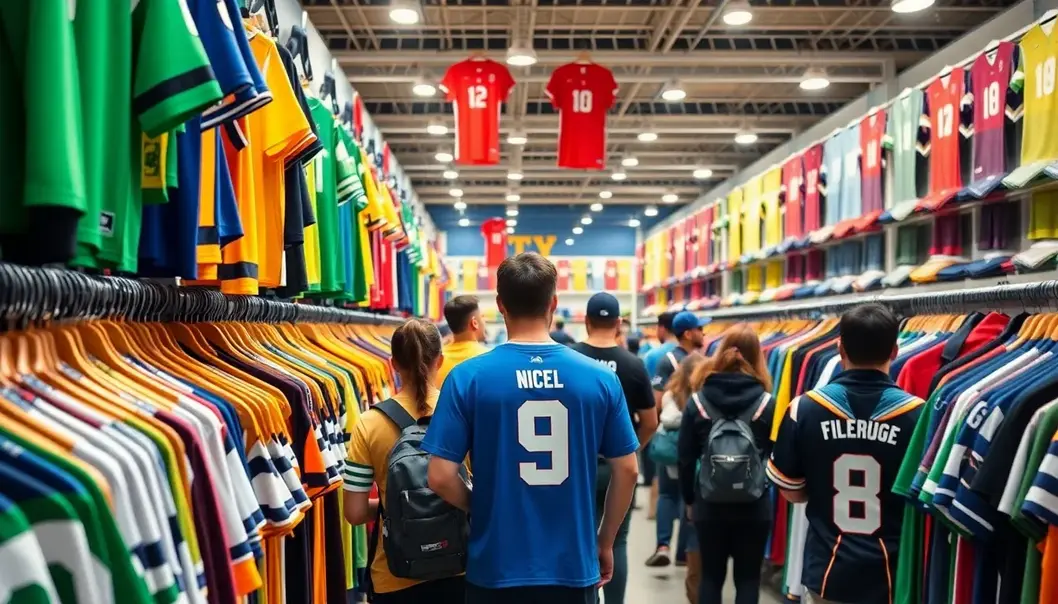Fast fashion has transformed the landscape of clothing, offering trendy styles at breakneck speed and affordable prices. While sports fans might thrill at the availability of team jerseys and athletic gear in every design imaginable, the industry’s rapid pace comes with a cost. Behind the scenes, fast fashion raises significant ethical concerns—from labor exploitation to environmental impact. For the conscientious sports fan, understanding the full picture means tackling complex ethical dilemmas. As we delve into the world of fast fashion, let’s examine both the allure and the hidden costs, uncovering the truth behind the industry that outfits our stadiums and courts.
The Allure of Fast Fashion for Sports Fans

The pulse of fast fashion strikes a chord with sports fans, offering an array of the latest styles that allow them to express pride and solidarity with their teams. The attraction lies in its immediacy and economic accessibility, which enables fans to wear their allegiance on their sleeves without breaking the bank. Rather than waiting for high-end releases, sports enthusiasts relish the fast fashion cycle for its ability to reflect real-time team changes, player transfers, and special in-game events—a responsiveness mirroring the dynamic, ever-changing landscape of sports itself.
Economically, fast fashion dismantles the barriers between fans and their favorite jerseys or merchandise, creating an inclusive space where all fans can afford to showcase their support. This broad accessibility fosters a sense of unity and shared experience among fans, something critical in the world of sports where camaraderie is valued.
The plethora of options available in fast fashion caters to different tastes and preferences, much like the variety of sports that captivate global audiences. From limited edition kits commemorating memorable wins to gear marked with the signatures of their idols, fans can choose from a diverse palette that satisfies their desire for uniqueness.
Fast fashion’s rapid cadence often mirrors the exhilarating nature of sports events. Just as a game can pivot momentum in seconds, fast fashion thrives on quick turnovers, constantly refreshing its designs and leaving consumers craving the next novel item. Fans often experience an adrenaline spike similar to watching a live match when they get their hands on the latest gear.
Impulse buying is fervently fueled in this landscape, where the thrill of acquiring the newest merchandise taps into the psyche of fans eager to keep pace with trends. The concept of FOMO—fear of missing out—is precisely harnessed through fast fashion’s limited edition releases, driving fans to make spontaneous purchases.
Social media plays a pivotal role in this ecosystem, serving as a stage where the latest sportswear collections debut. Platforms pressure fans not only to stay informed but also to publicly affirm their allegiance. Influencers and sports celebrities amplify these trends, endorsing products that swiftly translate into must-haves, showing the intertwined nature of sports enthusiasm and fashion consumption.
Social networks create a feedback loop where fans receive constant stimuli to buy, driven by likes, shares, and the tangible sense of belonging that comes from wearing their team’s colors. This interconnectedness and the push for immediate feedback perpetuate the cycle of urgency and consumption, characterizing the enthralling yet contentious realm of fast fashion.
Ethical Dilemmas Under the Spotlight

Fast fashion has become a ubiquitous force, particularly compelling in the world of sports apparel. Yet, beneath the surface allure lies a series of ethical concerns that demand our attention. The dark side of this industry begins with labor practices. Many companies rely heavily on manufacturing facilities in developing countries where labor laws are less stringent. Workers often endure long hours in unsafe conditions for wages that fail to meet basic living standards. The pressure to produce rapidly and cheaply means corners are cut, leading to a cycle of exploitation that raises serious moral questions.
Beyond labor issues, the environmental impact of fast fashion is staggering. The mass production of clothing results in a significant carbon footprint due to the extensive use of water, energy, and toxic chemicals. Textile waste further compounds the problem; unsold and discarded items populate landfills at alarming rates, releasing greenhouse gases as they decompose. This environmental burden is exacerbated by a culture that promotes over-consumption and rapid disposability, norms especially prevalent among sports fans eager to keep up with every new season or team update.
Nevertheless, the growing awareness of these issues has sparked a movement toward sustainability. Some brands are beginning to adopt ethical practices, including the use of organic materials, fair trade certifications, and transparent supply chains. Initiatives focus on recycling and upcycling to reduce waste. Consumers, too, have significant power to effect change. By supporting brands committed to ethical standards and making informed purchasing decisions, sports fans can contribute to a shift toward sustainable fashion.
We must reflect on our buying habits and consider the ripple effects of our choices. By demanding transparency and accountability, we encourage the industry to reform. As consumers, we hold the key to transforming fast fashion into an opportunity for positive impact, pushing for a future where our love for sports does not come at the expense of people or the planet. Our collective choices can lead to a paradigm shift, steering the industry toward a more ethical and sustainable future.
Final words
Fast fashion presents both a thrilling opportunity and a complex ethical challenge for sports fans. While it offers easy access to the latest sportswear and enables expression of team spirit, the hidden costs compel us to think critically about our consumption choices. The call is for fans to seek balance—embracing team spirit responsibly and supporting sustainability initiatives. In doing so, they make a positive impact far beyond stadiums.
Take a stand for ethical consumerism in your sports gear choices by supporting sustainable brands. Discover how you can help reduce the impact.
Learn more: https://www.ethicalsportsware.com
About us
Ethical Sportsware provides ethically-sourced and sustainable sports apparel, offering fans a way to support their teams without compromising on environmental and ethical values. Explore our latest collections and make a conscious choice today.
